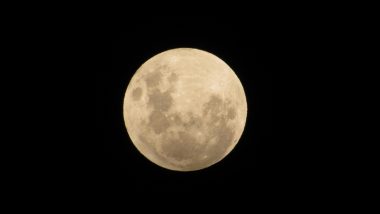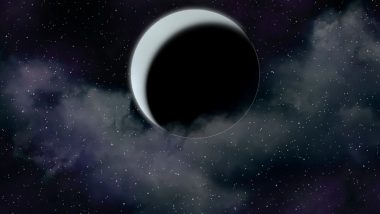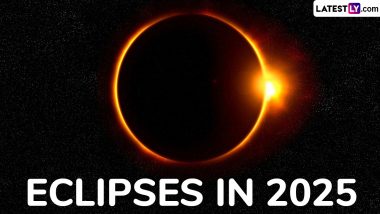The New Year's first lunar eclipse will be witnessed on January 10, 2020. A lunar eclipse is a celestial event where the earth's shadow blocks sunlight. This lunar eclipse can either be total, partial and penumbral, based on the position of the moon, sun and earth. And the one we will experience will be a penumbral lunar eclipse. This is the first of the four penumbral lunar eclipses of 2020 and will be visible in India as well. Whether you are enthusiastic about watching the 2020 lunar eclipse, which will last for four hours and five minutes or are a believer in the various lunar eclipse myths and superstitions, you need to be well-informed about this important celestial event. And if you are one of them, here is everything you need to know about the January 2020 Penumbral Lunar Eclipse. Celestial Calendar of January 2020: Quadrantids Meteor Shower, Penumbral Lunar Eclipse And Other Astronomical Delights to Look Forward To in This Month.
What Is a Penumbral Lunar Eclipse?
A lunar eclipse is called penumbral when the earth, sun and moon are imperfectly aligned. The earth's shadow only manages to block some amount of the sun's light from reaching the moon and covers the moon entirely or some part of its shadow, which is also known as the penumbra. However, this penumbra will be much fainter than the earth's shadow, and it may be tough to distinguish it.
When Is the First Lunar Eclipse?
As already mentioned, the first of the four penumbral lunar eclipses will begin on January 10, 2020, and go on well past midnight on January 11 in India. The lunar eclipse is expected to last from 10.37 pm to 2.42 am Indian Standard Time (IST).
Where Will the January 2020 Lunar Eclipse Be Visible?
In addition to its visibility in India, the penumbral lunar eclipse on January 10 can also be seen from Europe, Africa, Asia, and Australia.
While this is the first lunar eclipse of 2020, there are multiple other celestial events that we will witness in the coming year. From other penumbral lunar eclipses which will take place on June 5, July 5 and November 30, to the Annular Solar Eclipse on June 21 the year is filled with various events that will fulfil our love for astronomy! We hope that these details help you to enjoy the first lunar eclipse of the year!
(The above story first appeared on LatestLY on Jan 07, 2020 05:50 PM IST. For more news and updates on politics, world, sports, entertainment and lifestyle, log on to our website latestly.com).













 Quickly
Quickly




















